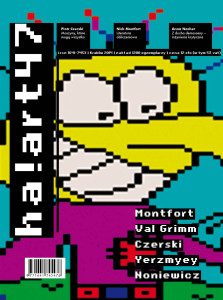It’s also in Polish, and should serve to inspire Anglophones! As my colleagues in Ubu’s homeland explain:
Last November, the independent Polish publishing house Korporacja Ha!art devoted an issue of its quarterly to the demoscene, a hacker subculture dedicated to creating multimedia computer programs on retro platforms. What we attempt to chronicle is a half-forgotten, mostly European scene of hard-core coders and ephemeral groups, who dedicate hundreds of sleepless nights with their Amigas and Spectrums, trying to outdo one another, to write terser code, to come up with new visual effects, to wow the audience. In the pre-Internet era, they even came up with their own publication and distribution channels. Always eager to present what is little known and under-researched, we trace the roots of the movement in the 1980s and its growth in Piotr Czerski’s exhaustive article; we look more closely at various platforms that formed the core of demoscene (Amiga, ZX Spectrum, Commodore) and at Polish wizards of code (some of whom, interestingly, looked up to Russian hackers); our authors tackle all sorts of ideas from the interplay between demoscene and glitch to schizophrenia as a tool of interpretation in media analysis. They also ponder the problematic relations between flashy, seemingly puerile demoscene productions and digital literature in an attempt to find the missing link in the evolution of electronic art. Trips down the memory lane by Jakub Noniewicz and Yerzmyey let us see demoscene forays into the world of (often irreverent) short stories and generative poetry. In fact, this kind of textual approach to demoscene has not been attempted before. We show how coders, working collaboratively, used computationality and tried multiple genres to bring the lexical and the audiovisual together. Last but not least, the perspectives of guests from across the Atlantic, Val Grimm and Nick Montfort, show how demoscene is, at heart, about breaking free from societal constraints.
The issue is part of Korporacja Ha!art’s effort to present seminal scholarship in digital media.


